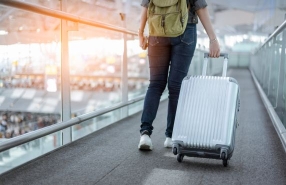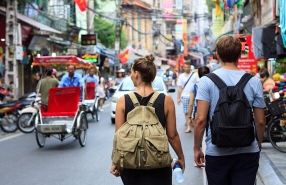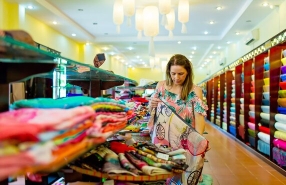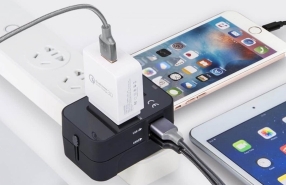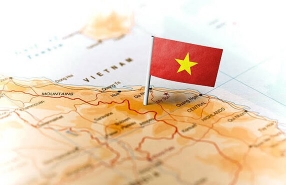Using basic greetings in Thai, such as saying hello in Thai and a few simple travel-friendly words, is often enough to break the ice and receive a warm smile in return. Combined with gestures like the wai, these polite efforts show cultural respect and help you enjoy more genuine interactions with locals. For those who prefer traveling without stress, turning to a specialized travel agency in Asia like Autour Asia is a smart choice. They can organize a smooth, well-planned, and immersive journey, allowing you to focus on cultural experiences and meaningful connections while all logistics are handled professionally.
How To Say Hello In Thai ?
Thursday, September 18, 2025
Useful infos

Learning a greeting in Thai is one of the simplest yet most meaningful ways to connect with locals while traveling. Knowing how to say hello in Thai, often paired with the traditional wai gesture, instantly shows respect and creates a welcoming atmosphere. When combined with a few basic travel phrases, this small effort can bring smiles, ease daily interactions, and even lead to more authentic exchanges. In a culture where politeness and respectful manners are deeply valued, learning these phrases not only improves communication but also enriches your journey, helping you experience Thailand in a warmer and more genuine way.
How do you say hello in Thai ?
I. Common phrases - What is a common Thai greeting?
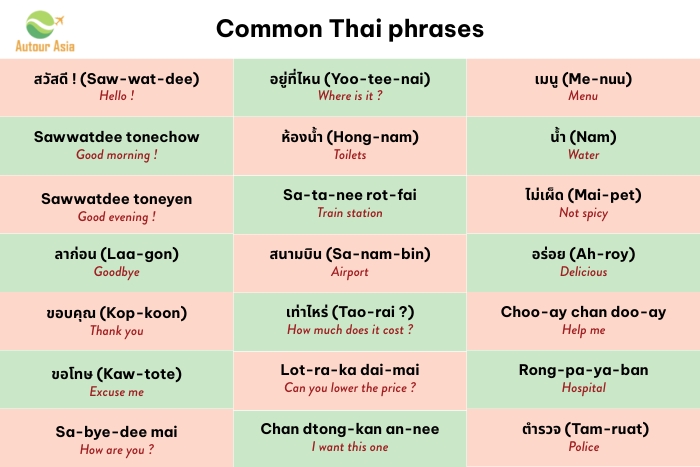
Greetings in Thailand are an essential part of daily life. Knowing how to say hello in Thai, or how to thank someone with a few simple words, opens the door to friendlier exchanges with locals. Here are some key phrases to make your trip smoother and more enjoyable:
1. Thai greetings
Hello: สวัสดี (Saw-wat-dee) – Used at any time of the day.
Good morning (morning): สวัสดีตอนเช้า (Saw-wat-dee tone-chow).
Good evening: สวัสดีตอนเย็น (Saw-wat-dee tone-yen).
Goodbye: ลาก่อน (Laa-gon) or สวัสดี (Saw-wat-dee, also used to say goodbye).
Thank you: ขอบคุณ (Kop-koon).
Excuse me: ขอโทษ (Kaw-tote).
How are you?: สบายดีไหม (Sa-bye-dee mai).
Note: In Thai, greetings change slightly depending on gender. When saying hello in Thai male, men add "ครับ" (khrap, pronounced krap) at the end of the phrase. For women, the polite form is hello in Thai female, where they add "ค่ะ" (kha, pronounced softly and falling as ka). This adds respect and warmth.
2. Ask for directions
Where is it?: อยู่ที่ไหน (Yoo-tee-nai).
Toilets: ห้องน้ํา (Hong-nam).
Train station: สถานีรถไฟ (Sa-ta-nee rot-fai).
Airport: สนามบิน (Sa-nam-bin).
3. Purchases
How much does it cost?: เท่าไหร่ (Tao-rai).
Can you lower the price?: ลดราคาได้ไหม (Lot-ra-ka dai-mai).
I want this one: ฉันต้องการอันนี้ (Chan dtong-kan an-nee).
4. In restaurant
Menu: เมนู (Me-nuu).
Water: น้ํา (Nam).
Not spicy: ไม่เผ็ด (Mai-pet)
Delicious: อร่อย (Ah-roy).
5. Emergencies
Help me: ช่วยฉันด้วย (Choo-ay chan doo-ay).
Hospital: โรงพยาบาล (Rong-pa-ya-ban).
Police: ตํารวจ (Tam-ruat).
II. Pronunciation Tips
Outside the major cities, English is not always widely spoken, so even learning a few Thai greetings can be greatly appreciated by locals. Since Thai is a tonal language, mastering correct sounds is essential. Paying attention to details like hello in Thai pronunciation helps ensure you are understood and respected.
s / t and t / d, l / r, j / ch, k / g can sometimes sound interchangeable.
h may appear or disappear to add aspiration without changing the word completely.
"ch" is pronounced like tch in Churchill.
Final l and n sounds may be interchangeable.
"ph" is an aspirated p, not f (example: Koh Phi Phi).
An unaspirated "p" often sounds close to "b".
"r" should be rolled, which can make it sound close to "l".
"u" is pronounced like "ou".
"ai" sounds like the “ai” in ride.
Short vowels are quick (e.g., kùn in ขอบคุณ), long vowels are stretched (e.g., náam in ห้องน้ํา).
III. Body language in Thai greetings
1. The "Wai" gesture
The wai is the most iconic way of greeting in Thailand. It consists of joining your palms as if in prayer and slightly bowing your head, usually with a gentle smile. More than just saying hello, this gesture conveys respect towards elders, monks, or strangers, and reflects the Thai values of harmony and tradition.
Depending on the context, there are several levels of Wai:
High wai: for monks, the royal family, or respected figures (hands at forehead level).
Intermediate wai: the most common, for friends, colleagues, or acquaintances (hands at chest or chin level).
Simple wai: used with younger people or those of lower rank (hands at stomach level, slight bow).
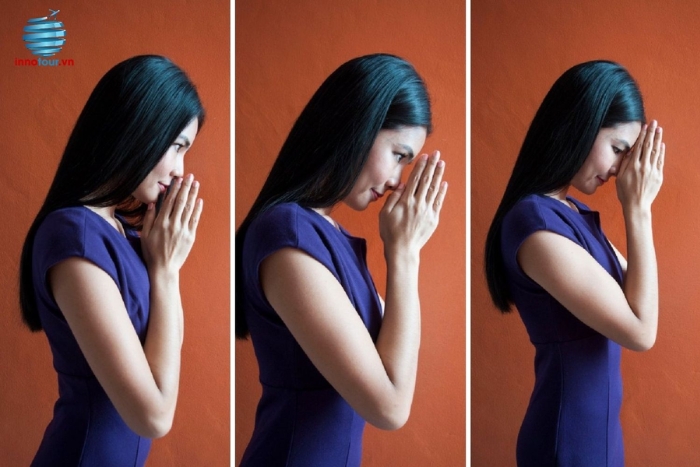
2. Other polite gestures
Smiles: A smile is the best companion to any Thai phrase like ขอบคุณ (thank you)
Avoid pointing with one finger: use an open hand instead.
Don’t touch people’s heads: the head is considered sacred.
Remove shoes before entering temples, homes, and some shops.
Keep calm: sudden or aggressive gestures go against the Thai ideal of serenity
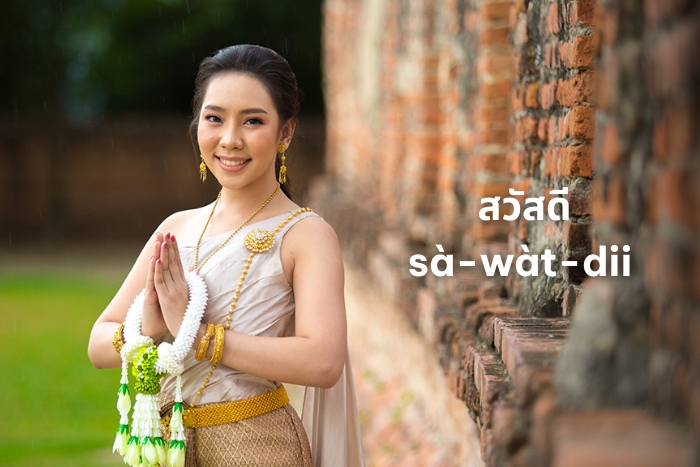
Related articles:
>>> Best Areas To Stay In Bangkok
>>> Thailand Travel Guide
>>> Thailand itinerary 2 weeks
>>> Thailand Packages Tours
Louise
5.0
Excellent
Is Thai easy to speak ?
When planning a family trip to Thailand, many travelers wonder if the Thai language is hard to learn. While it isn’t the easiest to master, Thai can actually feel simpler than English in some aspects. In everyday conversations, speakers often skip “I” or “you,” since context makes it clear. Thai also doesn’t use articles like “a/an” or “the,” and verbs stay the same without complicated conjugations. This makes its grammar more straightforward than many Western languages. Even if you only learn a few words, it will enrich your trip and help you connect with locals more warmly.
Kunthea
5.0
Excellent
Should foreigners Wai in Thailand ?
When visiting Thailand, many travelers wonder about the right way to greet locals and whether the wai is the correct way to say hello in Thai. In daily life, tourists often receive a wai in hotels, restaurants, or shops. Technically, customers are not expected to return it, since the gesture is usually reserved for showing respect to elders, monks, or higher-ranking people. However, many foreigners still return the wai because it feels polite and creates a friendly connection. A warm smile or a simple sawasdee is often enough to show respect while keeping the interaction natural.
Related travel guide
Other similar articles
CUSTOMIZABLE BY LOCAL EXPERTS
Personalized trip at the original price!
REFUND GUARANTEE
We believe in our work and promise to give you money back.
GOOD PRICE / QUALITY
95% satisfied more than expected!
24/7 LOCAL SUPPORT
We are always available online to provide assistance at any time.
Most read articles
Autour Asia is highly recommended on
Embracing the mission of "Satisfied more than expected" and providing authentic experiences, we have received numerous recommendations on reputable travel forums:












